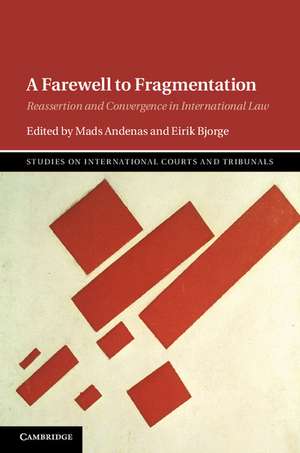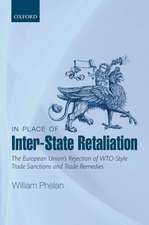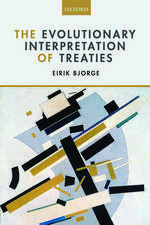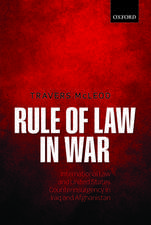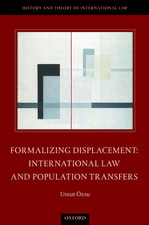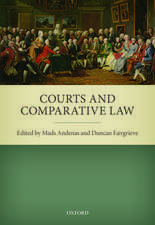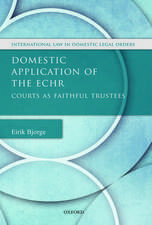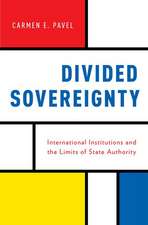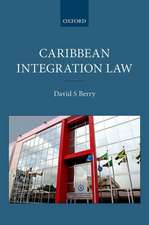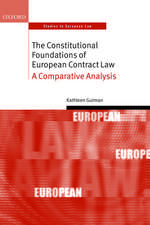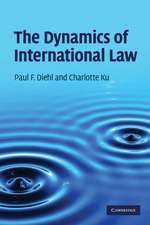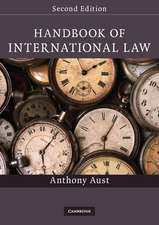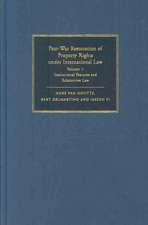A Farewell to Fragmentation: Reassertion and Convergence in International Law: Studies on International Courts and Tribunals
Editat de Mads Andenas, Eirik Bjorgeen Limba Engleză Hardback – 8 oct 2015
| Toate formatele și edițiile | Preț | Express |
|---|---|---|
| Paperback (1) | 434.18 lei 6-8 săpt. | |
| Cambridge University Press – 12 dec 2018 | 434.18 lei 6-8 săpt. | |
| Hardback (1) | 1010.86 lei 6-8 săpt. | |
| Cambridge University Press – 8 oct 2015 | 1010.86 lei 6-8 săpt. |
Din seria Studies on International Courts and Tribunals
-
 Preț: 424.15 lei
Preț: 424.15 lei - 9%
 Preț: 662.90 lei
Preț: 662.90 lei -
 Preț: 169.60 lei
Preț: 169.60 lei -
 Preț: 434.18 lei
Preț: 434.18 lei -
 Preț: 436.13 lei
Preț: 436.13 lei -
 Preț: 322.29 lei
Preț: 322.29 lei -
 Preț: 361.92 lei
Preț: 361.92 lei -
 Preț: 357.89 lei
Preț: 357.89 lei -
 Preț: 320.93 lei
Preț: 320.93 lei - 14%
 Preț: 735.49 lei
Preț: 735.49 lei - 14%
 Preț: 899.47 lei
Preț: 899.47 lei -
 Preț: 278.62 lei
Preț: 278.62 lei - 14%
 Preț: 728.37 lei
Preț: 728.37 lei - 14%
 Preț: 731.05 lei
Preț: 731.05 lei - 14%
 Preț: 793.92 lei
Preț: 793.92 lei - 11%
 Preț: 639.92 lei
Preț: 639.92 lei - 14%
 Preț: 738.86 lei
Preț: 738.86 lei - 9%
 Preț: 877.96 lei
Preț: 877.96 lei - 14%
 Preț: 704.58 lei
Preț: 704.58 lei - 11%
 Preț: 641.13 lei
Preț: 641.13 lei - 14%
 Preț: 698.27 lei
Preț: 698.27 lei - 14%
 Preț: 872.35 lei
Preț: 872.35 lei - 14%
 Preț: 694.64 lei
Preț: 694.64 lei -
 Preț: 360.78 lei
Preț: 360.78 lei
Preț: 1010.86 lei
Preț vechi: 1175.41 lei
-14% Nou
Puncte Express: 1516
Preț estimativ în valută:
193.43€ • 202.47$ • 160.99£
193.43€ • 202.47$ • 160.99£
Carte tipărită la comandă
Livrare economică 31 martie-14 aprilie
Preluare comenzi: 021 569.72.76
Specificații
ISBN-13: 9781107082090
ISBN-10: 1107082099
Pagini: 604
Ilustrații: black & white illustrations
Dimensiuni: 159 x 235 x 39 mm
Greutate: 0.97 kg
Editura: Cambridge University Press
Colecția Cambridge University Press
Seria Studies on International Courts and Tribunals
Locul publicării:New York, United States
ISBN-10: 1107082099
Pagini: 604
Ilustrații: black & white illustrations
Dimensiuni: 159 x 235 x 39 mm
Greutate: 0.97 kg
Editura: Cambridge University Press
Colecția Cambridge University Press
Seria Studies on International Courts and Tribunals
Locul publicării:New York, United States
Cuprins
List of contributors; 1. Introduction: from fragmentation to convergence Mads Andenas and Eirik Bjorge; Part I. Reassertion and Convergence: 'Proliferation' of Courts and the Centre of International Law; Section A. At the Centre: The International Court: 2. Unity and diversity in international law Christopher Greenwood; 3. A century of international justice and prospects for the future Antônio Augusto Cançado Trindade; 4. The International Court of Justice and human rights treaty bodies Nigel Rodley; 5. The ICJ and the challenges of human rights law Vera Gowlland-Debbas; 6. Factors influencing fragmentation and convergence in international courts Philippa Webb; Section B. 'Regimes' of International Law: 7. Fragmentation or partnership? The reception of ICJ case-law by the European Court of Human Rights Dean Spielmann; 8. Factors influencing the reception of international law in the case law of the ECtHR's case law: a review Magdalena Forowicz; 9. The influence of the International Court of Justice on the law of provisional measures Cameron A. Miles; 10. Just another case of treaty interpretation? Reconciling humanitarian and human rights law in the ICJ Lawrence Hill-Cawthorne; 11. Fragmentation within international human rights law Mehrdad Payandeh; 12. The European Union's participation in international economic institutions: a mutually beneficial reassertion of the centre Emanuel Castellarin; 13. Reinforcing the ICJ's central international role? Domestic courts' enforcement of ICJ decisions and opinions Veronika Fikfak; Part II. A Farewell to Fragmentation and the Sources of International Law; Section A. Custom and Jus Cogens: 14. The International Court of Justice and the international customary law game of cards Lorenzo Gradoni; 15. State practice, treaty practice and state immunity Alexander Orakhelashvili; 16. Historical sketches of custom in international law Jean-Louis Halpérin; Section B. Treaty Interpretation: 17. Is there a subject-matter ontology in interpretation of international legal norms? Robert Kolb; 18. Halfway between fragmentation and convergence: the role of the rules of the organization in the interpretation of constituent treaties Paolo Palchetti; 19. The convergence of the methods of treaty interpretation Eirik Bjorge; 20. The centre reasserting itself Mads Andenas; Index.
Recenzii
'The book provides what is clearly missing in the fragmentation debate, that is, empirical evidence from the practice of courts and tribunals demonstrating the processes through which fragmentation and convergence occur. [The book] also succeeds in doing something that few multi-contributor volumes in law are able to achieve, that is, to construct a clear argument that runs throughout the entire book. The editors advanced a hypothesis and structured the chapters in such a way so as to allow for this argument to be developed through the course of the volume. Each chapter can be read as a standalone contribution, yet the book should be read as a monograph in order to view the development of the argument.' Jed Odermatt, International Journal of Constitutional Law
'The potential audience of A Farewell to Fragmentation should include anyone, including academics, students, and practitioners, who is interested in the debate(s) over fragmentation in international law. Since its overall argument is that fragmentation is now outweighed by its opposite, it may also interest those who are tired of hearing about fragmentation.' Sondre Torp Helmersen, Leiden Journal of International Law
'The potential audience of A Farewell to Fragmentation should include anyone, including academics, students, and practitioners, who is interested in the debate(s) over fragmentation in international law. Since its overall argument is that fragmentation is now outweighed by its opposite, it may also interest those who are tired of hearing about fragmentation.' Sondre Torp Helmersen, Leiden Journal of International Law
Descriere
Explores the role of the International Court of Justice in the re-convergence of international law.
